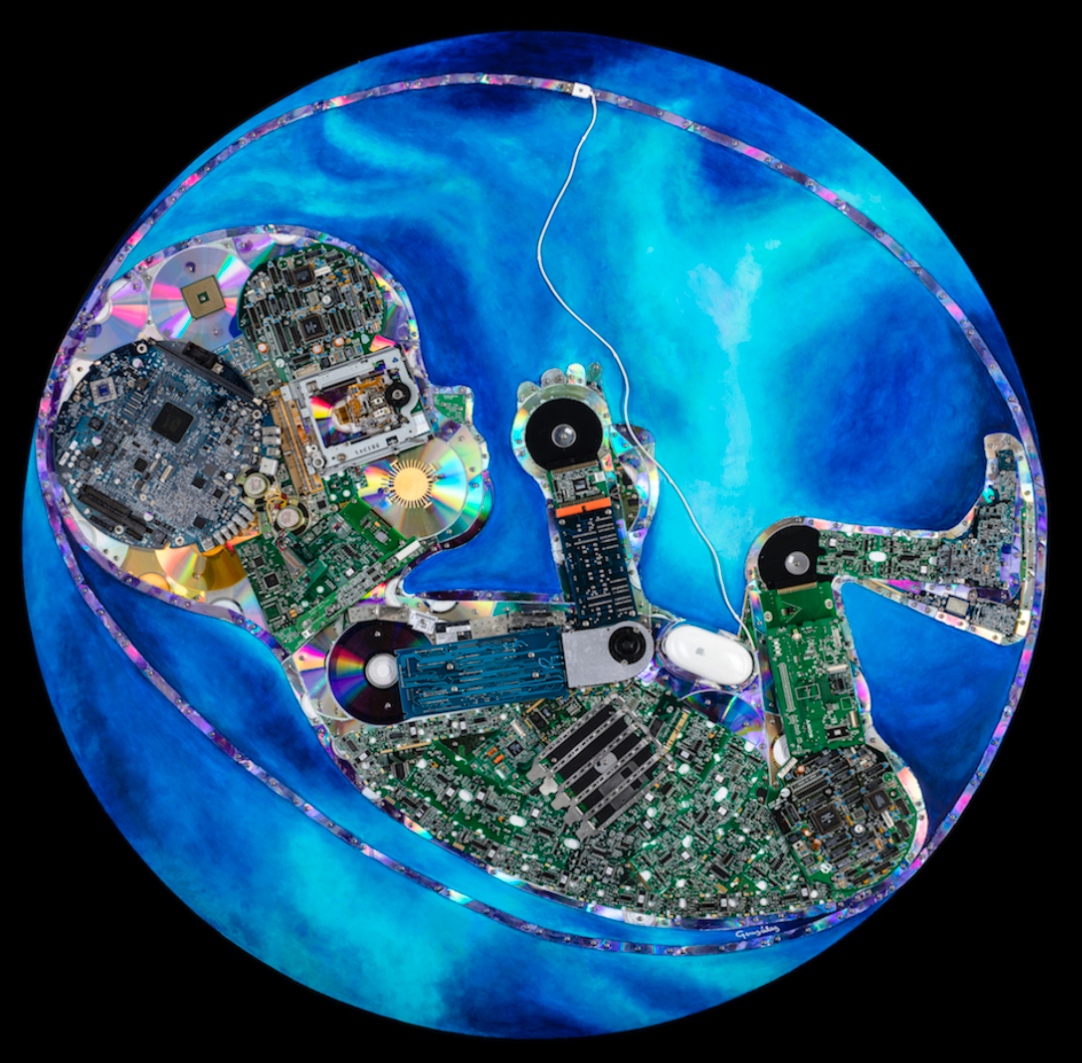Technology has become essential in people’s daily lives, impacting various aspects ranging from communication to commerce, education to entertainment. However, the increasing production and demand for new devices are leading to a rise in e-waste commonly disposed of in landfills, worsening environmental consequences.
Despite technology’s challenges, it also offers opportunities for solutions in areas like renewable energy, sustainable farming, and waste reduction. Artist Angela Gonzalez hopes to “engage audiences in a meaningful conversation about our ecological and social responsibilities, aiming for a greener tomorrow.” “As an artist, I create works to raise awareness about the environment and facilitate a connection between art, technology, and sustainability,” she said.
Latino News Network (LNN) spoke with the Charlotte-based artist whose work has been showcased in galleries, museums, corporations, and public spaces across the country. Some of those pieces are currently on display at the Carolinas Medical Center Art Gallery at Atrium Health and the Innovation Barn in North Carolina.
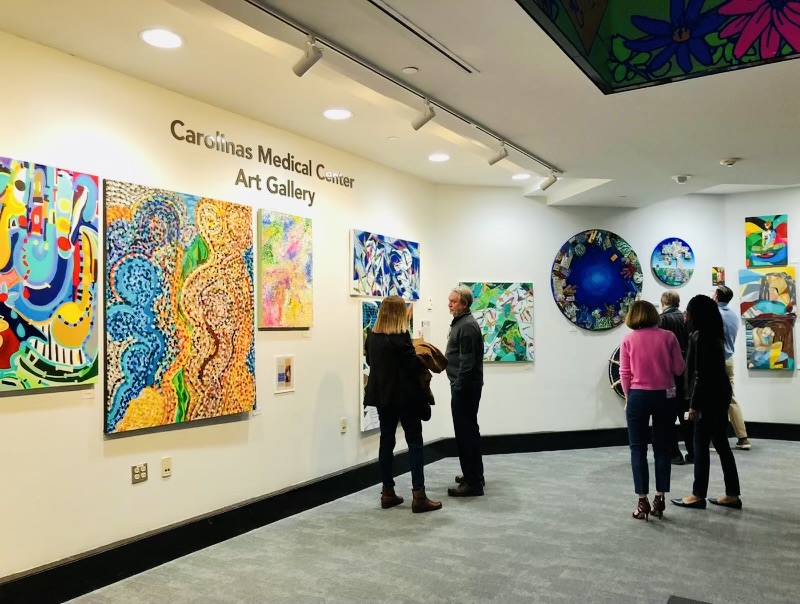
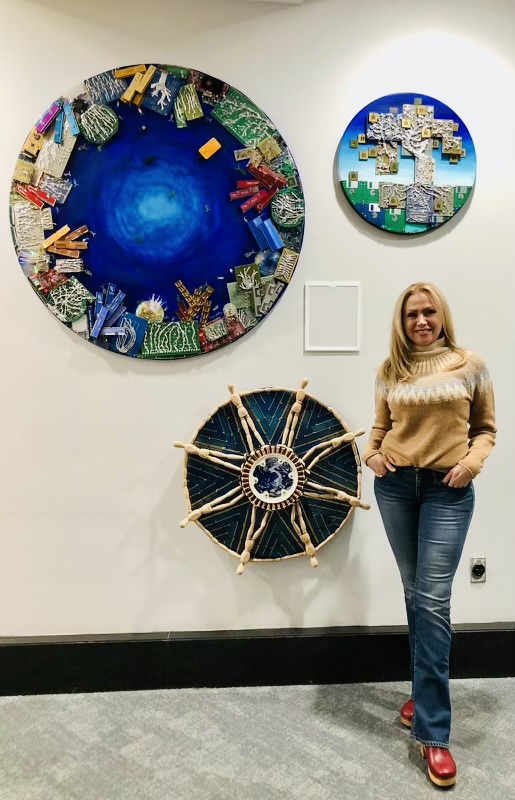
Carolinas Medical Center Art Gallery at Atrium Health (left); Angela Gonzalez poses with her art (right)
Gonzalez says her art is “driven by a profound concern for our planet’s plight.” Witnessing environmental degradation compels her to raise awareness and ignite dialogue about these issues, channeling this urgency into meaningful artistic expressions, aiming for a greener tomorrow.
She uses recycled computer hardware, such as memory and wireless cards, CDs, and peripherals. Gonzalez also incorporates other recycled materials, depending on the subject matter and the message she wants to deliver through her work. “These materials are attached with metal screws to a circular wood board, which is painted with acrylic,” she explained. “Through incorporating e-waste into my artwork, I actively contribute to removing it from the waste stream, thereby lessening its impact on the planet. I enjoy upcycling these materials and giving them a new life as part of my artwork.”
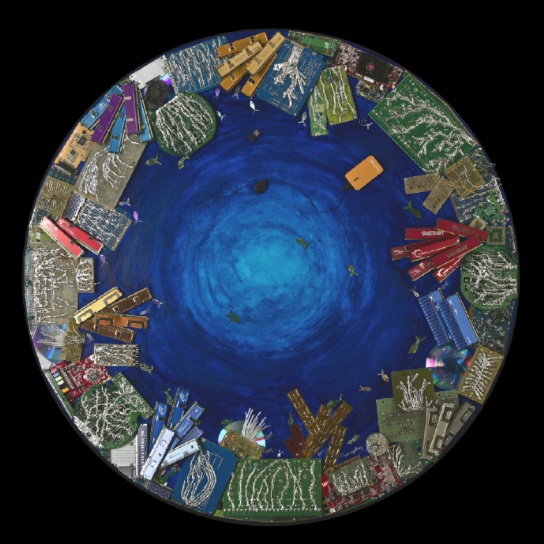
BleachBit, computer hardware, and acrylic on wood, 48-inches diameter (Angela Gonzalez www.artbygonzalez.com)
BleachBit, computer hardware, and acrylic on wood, displayed at the Carolinas Medical Center Art Gallery, is inspired by coral reefs, which Gonzalez says are the vital rainforests of the oceans. “BleachBit was drawn from a technology word: BleachBit, which acts as a digital cleaner, erasing all traces,” she said. “In ecological terms, coral bleaching reflects the loss of intracellular organisms and resilience in coral reefs.”
“There is a delicate symbiosis between coral polyps and algae. The reefs offer nutrients and shelter to algae, reciprocated with food and vibrant colors for the polyps through photosynthesis. Stress disrupts this harmony, leading to coral bleaching, where algae are expelled, whitening the corals,” Gonzalez said.
The decline of coral reefs is linked to human actions like overfishing, pollution, and coastal development, mirroring the impacts of global warming. Oceans play a vital role in absorbing a significant amount of atmospheric carbon dioxide, leading to the warming and acidification of water. These changes make it challenging for corals to survive, threatening their habitats, disrupting food chains, and reducing fish populations. “Altered marine ecosystems affect not just oceans but also society and the economy. Raising awareness and implementing changes are crucial in combating global warming,” Gonzalez said. BleachBit took her about two to three weeks to complete.
Exhibiting art in hospitals can positively affect patients, their companions, and staff, said Gonzalez. “It creates a more pleasant and calming environment, reducing stress and anxiety. As an artist and human being, it is magical to contribute to someone’s healing process through the power of your artwork.”
Gonzalez’s work will soon be on display at the Greenville Museum of Art as part of its upcoming show, “The Home I Never Knew: Ni de Aqui, Ni de Alla,” which opens in June 2024. The exhibition highlights the Latino/a/ artists’ range of individual and shared experiences associated with being both “from here” and “from there,” belonging or not belonging, or feeling mentally, emotionally, or culturally from elsewhere. It’s a subject the Colombian native knows all too well.
“As a Latina navigating life in the United States, I constantly feel like a fish out of water, swimming in the deep currents of a home far from home,” Gonzalez said.
Originally from Medellin, she moved to the U.S. 30 years ago. Gonzalez started her career as a fashion designer, and when she moved to the United States, her career evolved into visual arts. “When I started painting, I did it with oils, in the old master’s technique. Then, I moved to acrylics, mosaics, mixed media, and lately into installations,” she said.
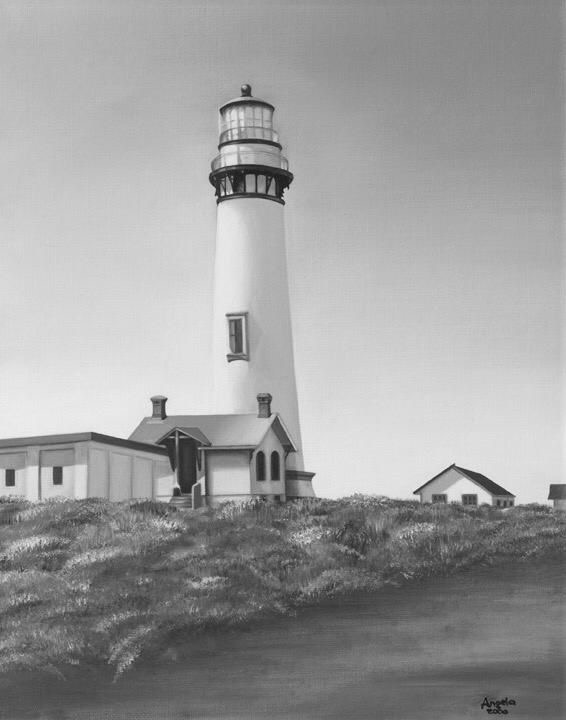


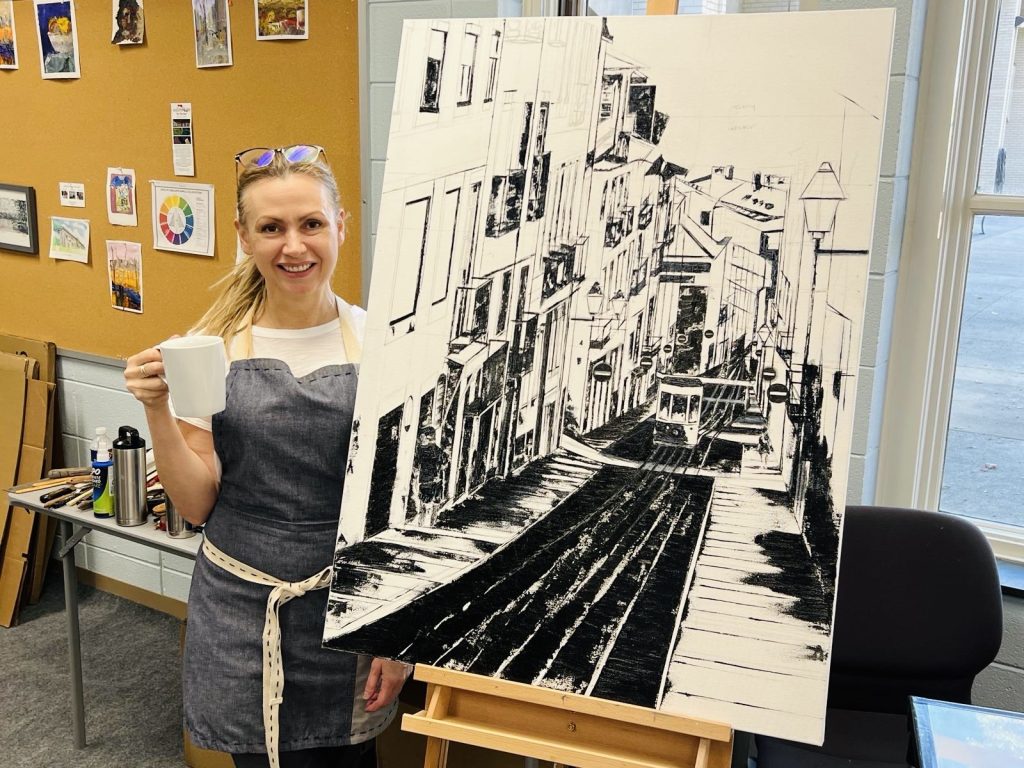
The artist has lived in different countries in Latin America, Europe and North America, including both coasts of the United States. “Living in all those places, I’ve amassed not only experiences and memories but also a wealth of perspectives, cultural insights, and a deeper understanding of diversity.
The culturally rich upbringing significantly shaped her personal growth, broadening her worldview and serving as a wellspring of inspiration, fueling not only her creativity but also driving Gonzalez to engage in social and environmental initiatives.
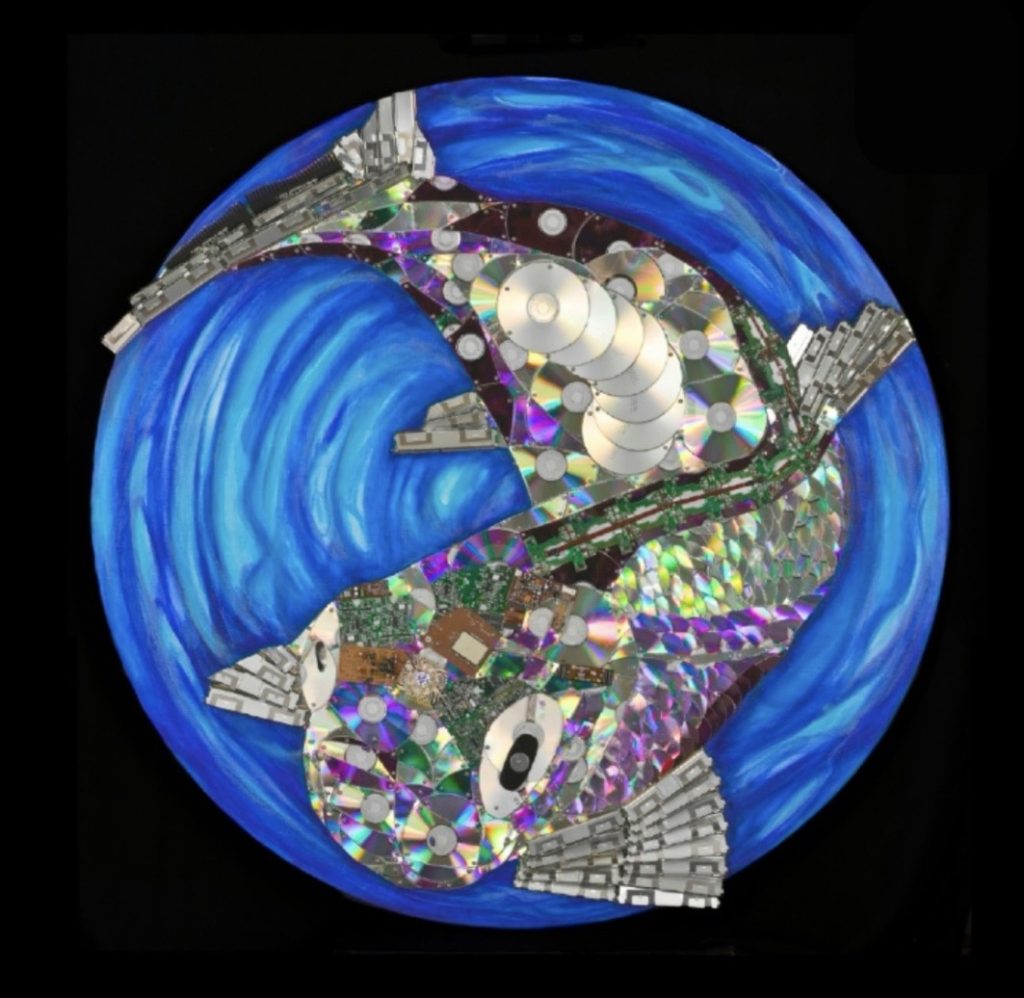
404 – Not Found, computer hardware and acrylic on wood, 44-inch diameter (Angela Gonzalez www.artbygonzalez.com)
“404—Not Found vividly portrays my diasporic journey, embodying the challenges and complexities of belonging and not belonging in a foreign land,” said Gonzalez. “This artistic creation reflects my quest for answers and the acceptance I’ve discovered amid the discomfort of existing between cultural spaces.”
Fashioned from recycled computer components, 404—Not Found exists at the crossroads of e-waste and her Latin American heritage. “Through this body of work, I advocate for the preservation of both the environment and the richness of Latin culture, which face threats from the increasing forces of globalization,” she said. Inspired by individual and collective struggles, Gonzalez said her goal “is to amplify the voices of those, like mine, who yearn to foster a dialogue that transcends political borders.”
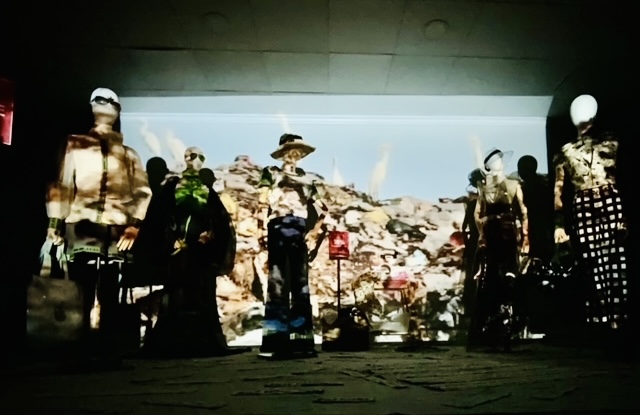
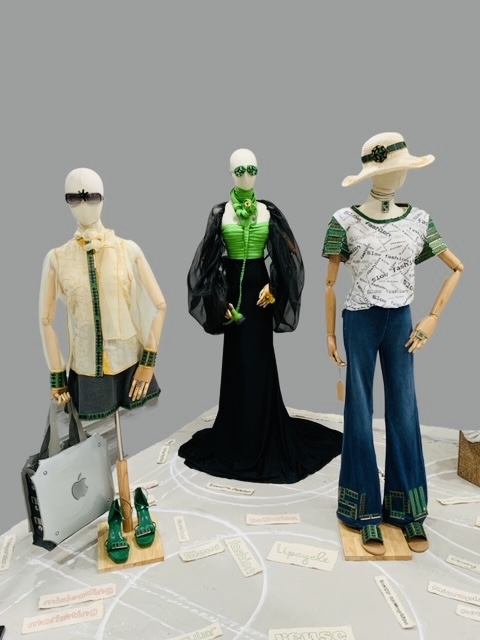
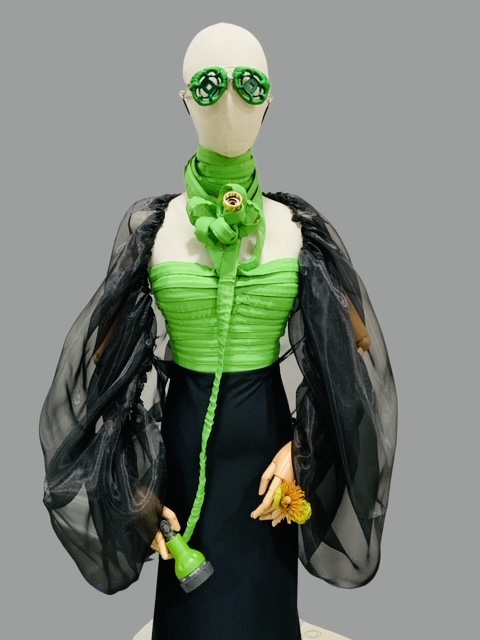
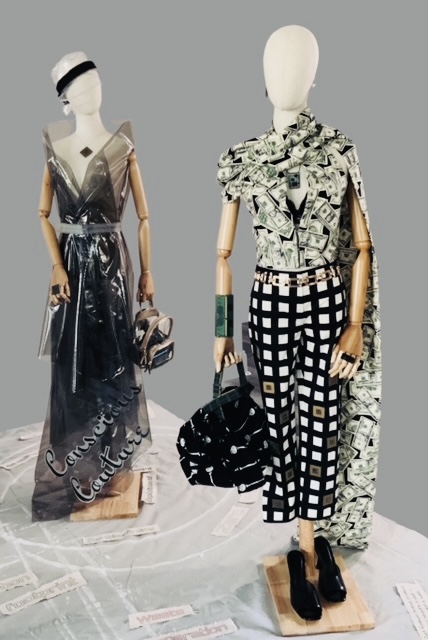
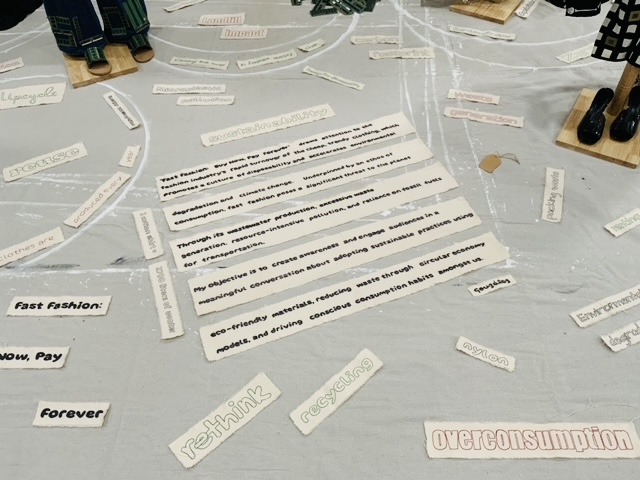
Fast Fashion: Buy Now, Pay Forever, Angela Gonzalez
In her most recent piece, “Fast Fashion: Buy Now, Pay Forever,” Gonzalez illuminates the fashion industry’s rapid turnover of inexpensive, trendy clothing, which fosters a culture of disposability and hastens environmental degradation and climate change. “Fast fashion, driven by consumption, poses significant threats through resource-intensive production, excessive waste, wastewater pollution, and reliance on fossil fuels for transportation,” she said.
The installation features five mannequins dressed in a mix of used garments from major fast-fashion brands and custom-made pieces, symbolizing different environmental concerns: the hose top alludes to excessive water usage and contamination, while the plastic gown and accessories reference microplastics and the need for supply chain transparency.
“Surrounding the mannequins is a sewing machine, three for sale and clearance signs representing aggressive marketing tactics, and a large canvas on the floor displaying statements and phrases highlighting the urgency of the message,” Gonzalez explained. Multimedia elements include an audio recording of a sewing machine running continuously and a video projection showing piles of clothing and other waste in landfills.
What began as a spark of creativity for Gonzalez, which involved creating caricatures of classmates, rearranging furniture, making small paintings for family, and crafting wearable art, transformed into a flame of inspiration for a life’s work of transmitting beauty while prompting reflection on the impact of our actions on the planet.
“By repurposing e-waste, I metaphorically deconstruct my sense of belonging and construct a visual language that conveys an alternative world which I call home,” said Angela Gonzalez.
While living in the Bay Area, Angela Gonzalez was interviewed about her collaboration with marketing analytics software firm Beckon Inc. The artist explains how she creates works from recycled materials and convert them into pieces that help viewers make the connection between art, technology and sustainability.
Cover Photo: 7.4 GIG, computer hardware and acrylic on wood, 44-inch diameter (Angela Gonzalez www.artbygonzalez.com)
Angela Gonzalez: Intertwining motherboards, Mother Earth, and my mother country, a new creation was conceived: 7.4 GIG. Through this artwork, I explore the imminent arrival of a new existence, a rebirth of my being. The portrayal of a fetus in a womb captures the anticipation of debuting in an unfamiliar world, marked by fear of the unknown yet still connected by an umbilical cord to its roots.
To see more of Angela Gonzalez’s work, click HERE.
